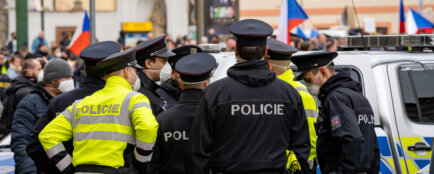History of the Police of the Czech Republic
The Police of the Czech Republic, as we know it today, was established in 1991, when it was established as an independent armed force under the Ministry of the Interior of the Czech Republic by the Police Act of the Czech Republic. This step came after the fall of the communist regime. Before 1991, the police were part of a wider structure that included the Public Security Service, which was subordinate to the Ministry of the Interior and performed the functions of protecting public order and investigating criminal activities.
After 1989, with the fall of the socialist regime and the beginning of democratic changes, it was necessary to reassess the role of the police, its structure and powers. The new legal framework regulating the powers of the Police of the Czech Republic aimed to transform the police into a modern and professional force that respected human rights and was under democratic control. The above-mentioned Law on the Police of the Czech Republic became the basic regulation, which clearly defined the tasks, powers and organisational structure.
In the following years, the role of the police began to evolve according to the needs of post-communist society and the Czech Republic’s membership in international organisations. A key milestone was the Czech Republic’s accession to the European Union in 2004. This step meant not only economic but also security integration into the wider European area, which required the Czech Police to adapt to European standards.
Who establishes the police and what laws govern them
The Police of the Czech Republic is an armed security force established by the state. Specifically, it falls under the Ministry of the Interior of the Czech Republic, which manages and supervises its activities. The legal framework is mainly set out in the Act on the Police of the Czech Republic, which clearly defines the tasks, powers and responsibilities of the police.
This Act states that the Police of the Czech Republic serves the public and its task is to protect the safety of persons and property, public order, detect crimes, supervise the safety and fluidity of road traffic and perform other tasks stipulated by law.
Another important law that relates to the status of police officers is the Law on the Service of Members of the Security Forces. This regulates the rights and duties of police officers, their service, remuneration or disciplinary responsibility.
Are you solving a similar problem?
Fast and expert online legal advice
Need legal advice? Our legal clinic is here for you! We will answer your query within 48 hours online, without the need for a personal visit. Whether you are dealing with questions about employment law, contracts, inheritance or other legal matters, our experts will provide you with clear and specific answers.
That's what I'm wondering
- When you order, you know what you will get and how much it will cost.
- We handle everything online or in person at one of our 6 offices.
- We handle 8 out of 10 requests within 2 working days.
- We have specialists for every field of law.
Police Presidium: the controlling brain of the police
The Police Presidium of the Czech Republic is the supreme governing body. It is the central department of the police, responsible for national coordination of activities, strategic management, methodology, international cooperation and a number of other important functions.
The Police Presidium is headed by the Police President, who is appointed and dismissed by the Minister of the Interior. He is responsible for the functioning of the entire police force and issues service management acts which influence procedures at all levels.
For example, the following specialised departments fall under the Police Presidium:
- National Centre against Organised Crime (NCOZ)
- Rapid Deployment Unit (URNA)
- Criminalistics Institute Prague
- Unit for the Protection of the President of the Republic
Organisational structure of the Police of the Czech Republic
The structure of the police is divided according to the territorial division of the state. It is based on regional police directorates, which operate in all 14 regions of the Czech Republic. These are further divided into territorial departments and district police departments, which are the basic links in the performance of the service – it is here that you will meet ordinary patrols or investigators.
In addition to the territorial departments, the police also have specialised units, which together ensure the comprehensive performance of the security functions of the state. The basic pillar is the riot police, which oversees public order, intervenes in misdemeanours and provides routine policing on the streets. The traffic police are in charge of road safety, checking drivers, investigating traffic accidents and participating in prevention.
The Criminal Police and Investigations have a specific role, detecting and investigating serious crime – from murder to organised crime to economic offences. The Aliens Police controls compliance with the residence regime of foreigners in the Czech Republic and cooperates in the field of international migration. Another important element is the special unit URNA (Rapid Deployment Unit), which intervenes in extremely dangerous situations such as armed attacks, kidnappings or terrorist threats.
All units are supervised by the Police Presidium, which provides methodological guidance, coordination and strategic development of the entire police force.
Tip for article
Tip: How do civil servants live under the Civil Service Law? This regulates the conditions under which civil servants can perform their work, including the establishment and termination of their service.
Who controls the police?
As the police have considerable powers, it is very important that someone publicly oversees their activities. There are several control mechanisms in the Czech Republic:
- The General Inspectorate of Security Forces (GIBS): the GIBS investigates criminal activities of police officers and other members of the security forces.
- TheOmbudsman oversees the activities of the state administration, including the police, if there is a complaint.
- Parliamentary scrutiny: Committees of the House of Representatives also have the right to look into the activities of the police.
The police themselves have internal control mechanisms, including internal control departments.
Police School: Where a new police officer is born
Every future police officer must undergo training. This is provided by the police school or by several training institutions under the Ministry of the Interior. Thus, police officers do not only undergo physical training, but also legal training, communication and other disciplines.
Secondary education is then offered to future police officers by the secondary police school, where students receive not only a high school diploma but also a basic overview of security issues. The school is suitable for young people considering a career in the security forces, but also for future civilian employees of the state.
At the higher education level, the Police Academy of the Czech Republic in Prague, often referred to as the Police College, operates. This public university offers accredited bachelor’s and postgraduate courses in fields such as security and legal studies, public administration and crisis management. The Police College educates not only active members of the law enforcement agencies, but also civilian students. It also offers postgraduate education and research in the field of security.
Tip for article
Tip: Want to leave the police force? See what you can expect when you leave the force.
How to become a police officer?
If you are interested in becoming a police officer, you must meet the statutory requirements. According to the Law on the Service of Members of the Security Forces, the applicant must:
– be over 18 years of age,
- be a citizen of the Czech Republic,
- be of good character,
- be medically, physically and mentally fit,
- have at least secondary education with a high school diploma.
At the same time, the candidate must not be a member of a political party or political movement, must not be engaged in a trade or other gainful activity and must not be a member of the management or supervisory bodies of legal persons engaged in business activities.
Once recruited, a new recruit enters the service and also starts training, often at a police school. However, the police school itself is not a prerequisite for a candidate to be able to practise the profession of a police officer.
Summary
The Police of the Czech Republic, established in 1991 after the collapse of the socialist regime, is an armed force subordinate to the Ministry of the Interior, which provides protection of public order, investigation of criminal offences and supervision of road traffic. The police were transformed after 1989 into a modern and professional institution respecting human rights. After the Czech Republic joined the EU in 2004, it was integrated into European security structures. Its organisational structure includes regional directorates, specialised units (e.g. NCOZ, URNA) and the Police Presidium, which coordinates national activities. Future police officers undergo training at secondary police schools and the Police Academy of the Czech Republic. The conditions for joining the service include age over 18, Czech citizenship, integrity and medical fitness. Police performance is controlled by several mechanisms, including the GIBS and parliamentary control.
Frequently Asked Questions
What are the official police ranks in the Czech Republic and how does a police officer's career progress?
Police ranks in the Czech Republic are regulated by the Law on the Service of Members of the Security Forces. The basic hierarchy includes ranks from constable, to chief inspector, to general. Career development of a police officer depends on length of service, evaluation results, professional training and passing service examinations. Some specialized departments also require higher professional qualifications or education from the Police Academy of the Czech Republic or a higher police school. The granting of ranks is strictly regulated and linked to the rank and responsibility of the police officer within the organisational structure.
What does the Czech police uniform look like and does it differ by department or rank?
The police uniform of the Czech Republic has a uniform design that includes elements indicating affiliation to the Police of the Czech Republic, such as the service number, identification inscriptions and the type of rank. Uniforms may have different variants – service, equipment or emergency. Special units, such as the URNA or traffic police, also have their own modifications of the uniform according to the type of activity. Similarly, the uniforms of new officers who join after graduating from a police high school in the country, a higher police school or training within the police force may vary.
What does the Police Academy of the Czech Republic offer and how does it differ from a higher police school or other police training institutions?
The Police Academy of the Czech Republic is a public university that provides bachelor’s, master’s and postgraduate education in security and law. Both members of the security forces and civilian students study here. In contrast, the police college is primarily for the professional training of police officers, especially those already in the service who need specialised courses or preparation for leadership positions. Police secondary schools in the country are designed for students who have completed primary school and want to prepare for police service from secondary school onwards. Individual institutions therefore differ in their level of study, access conditions and professional focus.
What courses and training are provided by police secondary schools in the Czech Republic and for whom are they suitable?
Police secondary schools in the Czech Republic offer graduation courses focused on security and legal activities, police training or protection of persons and property. Students learn the basics of law, crisis management, criminal issues and physical training. The schools are suitable for young people who are planning a career in the Police Department or municipal police, or who wish to continue their studies at the Police Academy. This type of school provides a solid foundation for further professional growth and entry into the service.
What is the difference between the police high schools, the police college and the Police Academy for future candidates for the service?
Police secondary schools provide secondary education with a high school diploma and basic vocational training. Graduates can enter the service or continue their studies.
Higher Police School is designed for police officers who are already in the service and need to deepen their professional skills, for example for managerial or specialised positions.
The Police Academy of the Czech Republic represents the third level – higher education – which is suitable for those aiming for analytical, methodological or managerial positions.
The choice of an institution thus depends on the educational background, ambitions and career direction of the person interested in serving in the Police of the Czech Republic.




